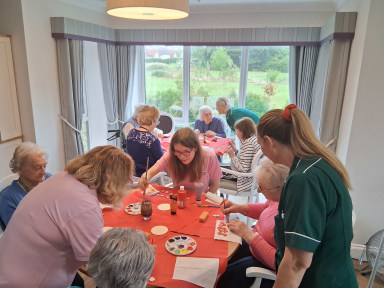Dementia and Sleep Patterns: How to Help Your Loved One Rest More Soundly


Sleep disruption is one of the biggest challenges for people living with dementia. It can affect mood, memory, safety, and overall wellbeing. At Westgate Healthcare, we see this every day across our care homes and know that even small changes can make a big difference.
This guide explains how dementia affects sleep, shares practical strategies to encourage better rest, and outlines safe nighttime routines that support both people with dementia and their carers.
Why Sleep Disruption Happens in Dementia
• Brain changes and circadian rhythm disruption Dementia affects areas of the brain that regulate sleep and wake cycles. This often leads to irregular sleep patterns or “day-night reversal.” Melatonin, the hormone that signals darkness and rest, may also decline.
• Body temperature regulation difficulties Some people with dementia cannot always sense whether they are hot or cold. The body’s natural cooling at night can make them restless if not dressed warmly enough.
• Increased Evening Confusion For many people with dementia, confusion and agitation can rise from the late afternoon onwards. This pattern is sometimes referred to as “sundowning.” Restlessness or night-time waking is often not random; it may reflect the familiar structure of this part of the day, such as preparing family meals or looking after children after school. Providing meaningful activities during this period can help reduce restlessness and support a sense of purpose.
• Medical or physical issues Pain, urinary tract infections, sleep apnoea, restless legs, or even hunger and thirst can all interrupt rest. Side effects from medication may also contribute.
• Reduced activity and light exposure Limited time outdoors or excessive daytime napping can reduce the natural drive to sleep at night.
Strategies to Improve Sleep Naturally
From our care home experience and evidence-based guidance, families and staff can use gentle, non-medical approaches to help support sleep:
• Encourage exposure to light and activity Gentle exercise, social activities, and natural daylight in the morning help strengthen the body’s sleep-wake cycle. In the evening, closing curtains and lowering lighting in line with seasonal changes signals that it is time to rest.
• Comfort and warmth Since people with dementia may not sense temperature changes, adding a light extra layer at bedtime can improve comfort. Warm socks or a safe body warmer can also aid sleep.
• Meals and snacks Lighter “picky teas” often work better than heavy dinners. A carbohydrate-based snack or a warm milky drink before bed can help calm the body without affecting bladder control. Limiting fluids from late afternoon reduces nighttime bathroom trips.
• Rest without overstimulation Short, scheduled afternoon naps can restore energy and reduce evening agitation, lowering the risk of falls. This is particularly helpful if a person is an early riser and will become tired as the day progresses. Avoid late-day naps, which may interfere with nighttime sleep.
• Calming evening routines Relaxation before bed can include music, soft lighting, reading, or simply sitting quietly. Familiar objects, scents, or blankets often help a person with dementia feel safe.
Safe Nighttime Care Routines
Supporting sleep also involves creating a safe environment. Families at home can reduce fall risks by keeping pathways clear, using night-lights, and encouraging safe, non-slip footwear. Gentle floor-level or sensor lighting can guide someone safely to the bathroom without startling them. In our care homes, staff provide discreet observation and reassurance throughout the night. They get to know each person with dementia, follow their routines, and carry out regular checks to offer comfort when needed. This approach keeps residents safe and secure while avoiding unfamiliar changes that could cause confusion. We also use technology, such as sensor mats, to alert staff if a resident becomes restless or tries to leave their bed.
Supporting Carers
Poor sleep affects not only the person with dementia but also their carers. Fatigue can increase stress and reduce wellbeing for families and staff alike. In our homes, we prioritise teamwork and rota planning so that no one shoulders the strain alone. Families caring at home may benefit from respite care or external support. Organisations such as the Alzheimer’s Society or Dementia Care UK provide guidance, resources, and support groups that can help carers rest and maintain their wellbeing.
Calmer Nights, Brighter Days
Sleep challenges are a common part of dementia, but with the right strategies, they can often be eased. Creating comforting routines, ensuring warmth, managing sundowning, and monitoring patterns can make a significant difference.
At Westgate Healthcare, we combine professional expertise with a warm, attentive approach to care. Our personalised plans help people with dementia rest safely while giving families reassurance. With patience, support, and the right strategies, calmer nights and brighter days are possible.
click here for more details or to contact Westgate Healthcare Ltd
Latest Care Provider & Regulatory News
 24-Sep-28
Night out
24-Sep-28
Night out
 17-Sep-25
Making Memories at Bere Grove!
17-Sep-25
Making Memories at Bere Grove!
 17-Sep-25
Westgate Community Heroes Week: How Our Care Homes Gave Back
17-Sep-25
Westgate Community Heroes Week: How Our Care Homes Gave Back
 17-Sep-25
Ross on Wye Mayor Visits Our care Home
17-Sep-25
Ross on Wye Mayor Visits Our care Home
 17-Sep-25
Dementia and Sleep Patterns: How to Help Your Loved One Rest More Soundly
17-Sep-25
Dementia and Sleep Patterns: How to Help Your Loved One Rest More Soundly